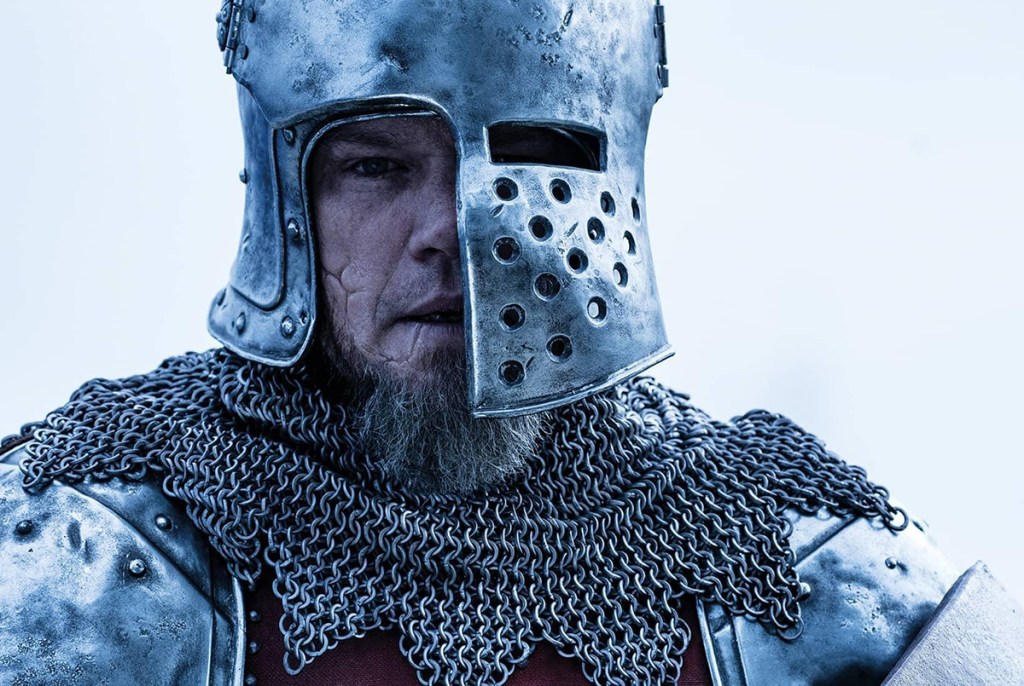Ridley Scott’s The Last Duel is set in the 14th century and is a tale of rivalry and rape told from three points of view, when two would probably have been sufficient. The best is saved to last, perhaps unforgivably. It’s the woman’s story, starring Jodie Comer who is sensational, so do hang on in there for that. However, I can’t guarantee that you won’t have severe battle-scene fatigue by then.
Based on true events and, loosely, on the book by Eric Jager, it stars Adam Driver (trying hard not to sound American and sometimes failing) as the nobleman Jacques Le Gris and a strangely mulleted Matt Damon (also trying hard not to sound American and sometimes failing) as fellow nobleman Jean de Carrouges. The two are friends at the outset, with a closeness that’s been cemented on the battlefields. (This is set during the Hundred Years’ War.) But when Le Gris is taken up by Count Pierre d’Alençon (Ben Affleck) and De Carrouges discovers, on his marriage to Marguerite de Thibouville (Comer), that the Count has taken the land promised as her dowry and awarded it to Le Gris, the two fall out, rather badly. Later, when Marguerite reports to her husband that Le Gris has raped her, bridges are, understandably, not built.
It opens with the titular last duel where the two men, who are being dressed in their armor, will have to fight to the death. (If De Carrouges survives, Marguerite was telling the truth, and if he doesn’t, she wasn’t, and she will be burned at the stake. God will decide. God held a lot of sway back then.) We then spool to a few years earlier when the men are comrades-in-arms on the battlefield at Limoges and De Carrouges saves Le Gris’s life. Or did he? Across the three stories — written by Damon, Affleck and Nicole Holofcener — there are discrepancies as both men, in particular, bend the truth to serve their needs and their honor. On occasion it’s fascinating to note how accounts differ — one scene involving a kiss is flirtatious from one point of view, disturbing from another — but it does mean we see the same episodes multiple times. Horses galloping up to castles, horrific, grisly battles packed with terrifying but indistinct events, happen over and over without furthering the narrative or paying due attention to what is at the heart of the film, which is Marguerite.
While Le Gris and De Carrouges are one-note — the former is swaggeringly entitled, the latter is more of a strongheaded bruiser — Comer brings nuance and complexity to a character who has a bitter fight for justice on her hands. This is a time when rape was not a crime against a woman — as she was a man’s property, it was a crime against him — and as her mother-in-law (Harriet Walter) tells her, you’re raped, you put up with it, you shut up, happened to me, happens to us all. That women have no power in this world is, perhaps, spelled out too much — can’t believe I just said that — but Comer is sensational. Her Marguerite is vulnerable yet strong, frightened but won’t be quietened. (‘I will not be silent.’)
The Last Duel comes in at two and a half hours and the last half an hour is gripping. But it should have been more weighted towards ‘the truth’, as Marguerite’s version is called, from earlier. It does feel unbalanced in this way. Why has she been marginalized? As for the last duel itself, it is so extended it does put you in mind of Monty Python and the Holy Grail. (‘’Tis but a scratch.’ ‘A scratch? Your arm’s off!’) This is bleak, brutal and bloody with little respite — aside from Affleck’s Count Pierre, who is nicely bitchy. But Marguerite’s story? Worth watching solely for that.
This article was originally published in The Spectator’s UK magazine. Subscribe to the World edition here.

























